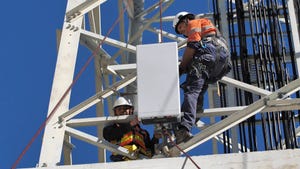Will RBOCs Spend More on Broadband?
The FCC may have ruled to give the Bells radical regulatory relief on broadband, but when will it pay off?
February 26, 2003

Waiting for deregulation to spur massive investment in broadband? Don’t hold you’re breath, industry observers say.
Years of promises from the regional Bells that lifting broadband regulations would equal aggressive new spending on high-speed fiber networks seem to have evaporated into thin air (see Babbio Bashes Price Regulation and SBC's Beck Is Big on Broadband ). Nearly a week after the Federal Communications Commission (FCC) ruled to abandon rules that require the Bells to share their high-frequency lines with competitive Internet service providers, they have given no indication that increased spending on broadband is anywhere on the horizon (see Powell Loses FCC Vote).
Instead of celebrating that the FCC decision eliminates line-sharing and competitors' access to the Bells’ fiber and partially fiber networks, the RBOCs have been busy complaining that the ruling didn’t do enough to roll back regulations on their voice networks (see Verizon CEO Disses FCC Ruling, BellSouth Bemoans FCC Ruling, Qwest Laments FCC Ruling and SBC Reacts to FCC Vote). “The immediate response of all the RBOCs was that they’re not going to spend until they win on UNE-P,” says Network Conceptions LLCanalyst Phil Jacobson.
In fact, SBC Communications Inc. (NYSE: SBC) has even indicated that continuing UNE-P regulations may force it to lower its capital spending guidance for 2003 from the $5-6 billion it has already forecast. “We’re going to have to take a hard look at that,” SBC’s CFO Randall Stephenson said at a Merrill Lynch & Co. Inc. conference in New York yesterday. SBC did not return calls today, but observers say they expect that the possible capex cuts would also affect broadband spending.
“They’re saying that it doesn’t matter that they got what they were asking for from the FCC,” Sue Ashdown, the president of the American ISP Association says. It's as though they're now saying they were "just kidding" in the first place, she adds.
Critics of the ruling claim that not only won’t it increase investment in the hard-hit sector, but that it will hurt competition and give the RBOCs the monopolistic power to raise prices (see Covad CEO Sticks to His Guns). "I'm not so sure... why it makes sense to assure continued competition in voice services... but with regards to broadband competition, that is eliminated by removing line-sharing," Congresswoman Anna Eshoo (D-CA) said at a congressional hearing on the FCC ruling today.
Verizon Communications Inc. (NYSE: VZ) spokesperson Larry Plumb insists, however, that it’s too early to hold the Bells to their promises of increased spending on broadband. “The order is still a bit confused to us,” he says, insisting that it’s still unclear whether the broadband ruling will actually be beneficial to the RBOCs.
For instance, he says, part of the FCC ruling states that the Bells may not retire copper loops without receiving approval from the state commission. “This could mean that we would have to run two networks in tandem,” he says, pointing out that that would remove the incentive to invest in new technology. “We don’t know yet. We have to wait for clarification.”
In addition, Plumb says, Verizon has never said that it would start investing immediately after the regulations were removed. “Investment is not something that happens overnight. The business case has to be developed,” he says, pointing out that consideration for Wall Street also restricts companies from simply upping their capex when their revenues are still stagnant or declining.
While the RBOCs continue to drag their feet, the Telecommunications Industry Association (TIA), which represents equipment vendors that would have a lot to gain if the investments do materialize, remains optimistic (see Fiber Players Giddy Over FCC Ruling). “We think it’s a historic move to allow investment to occur,” says TIA president Matthew Flannigan, insisting that the Bells will have to address a booming demand for the service. At the end of 2002, he says, there were about 15 million users of high-speed internet in the U.S. That number is expected to grow to 40 million over the next four years. “We think the RBOCs will invest,” he says. “[They] can now deploy without giving equipment to their competitors.”
Meanwhile, Verizon competitor AT&T Corp. (NYSE: T)is calling on the RBOCs to make good on their promises of increased investment right away. “There was a lot in this order that comes very close to what [the Bells] were asking for,” AT&T's David Dorman said at the Merrill Lynch conference in New York yesterday. “[They’re] coming to a point of either put up or shut up.”
— Eugénie Larson, Reporter, Light Reading
You May Also Like










